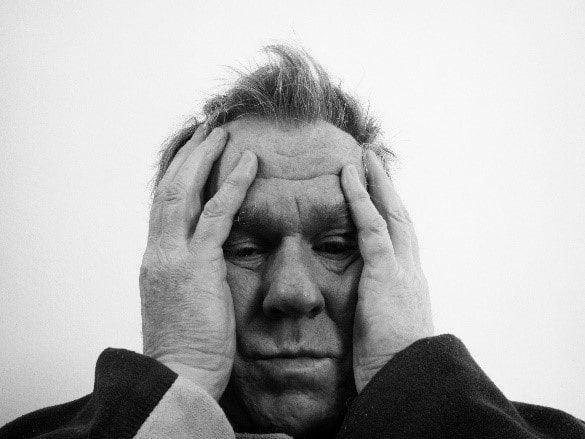The holidays are over. Lights taken down, decorations packed away, candles blown out. Maybe you’re more aware of the brevity of our days, the darkness or grayness of the weather and short days, or the loneliness as all of the activity has ended and you’re back at work full-time. While some of this is very normal and natural; feelings of depression, isolation, anxiety, or simply "feeling down" which are intense or last for more than two weeks can be a symptom of a more serious problem--depression.
Frequently the holidays bring to the surface long avoided feelings of loneliness, discouragement, or dissatisfaction with family relationships. You may find you feel disconnected from others, that you don't count, or that no one cares for you. Often food, music, and work are used to push away those feelings. But in bed, late at night, you're aware of the feelings again. And with no holiday to look forward to, it’s even harder to keep going.
It is important to determine whether the blues are temporary or are a symptom of depression. If it’s been more than 10-14 days, it's time to consider emotional reasons for depression. If they are deep and/or began in November, you might also need to consider whether you have seasonal affective disorder (SAD).
Generally, the holiday blues will resolve with no extra effort within a few weeks. While you may feel sad, tired, or distressed, you are able to handle everyday activities and responsibilities. Spring may become your goal as you deal with rain or the spring break vacation coming up. You are moving forward.
Depression is more intense than the "blues". First, the hope in the vacation or spring or some other experience is not present. Depression is interfering with your daily life. What used to be enjoyable may now feel like a burden. In fact, getting out of bed in the morning may be more than you can handle some days.
Other warning signs are:
First, see a therapist for a complete evaluation. For years studies have indicated that therapy along with anti-depressants is more effective than anti-depressants alone. Naturopaths and others also have good luck with herbal remedies many times. Then, increase physical activity as exercise allows the body to produce more endorphins which increases mood. Minimize the amount of sugar and flour you eat as these foods increase depression. Finally, get adequate but not excessive rest--six to nine hours per night. If this sounds like too much, choose one to try for the next week. If you don’t have success, then call one of the professionals I mentioned above. If you don’t know someone, ask a friend for a referral.
You might also try the following:
#thewholenessinstitute
Frequently the holidays bring to the surface long avoided feelings of loneliness, discouragement, or dissatisfaction with family relationships. You may find you feel disconnected from others, that you don't count, or that no one cares for you. Often food, music, and work are used to push away those feelings. But in bed, late at night, you're aware of the feelings again. And with no holiday to look forward to, it’s even harder to keep going.
It is important to determine whether the blues are temporary or are a symptom of depression. If it’s been more than 10-14 days, it's time to consider emotional reasons for depression. If they are deep and/or began in November, you might also need to consider whether you have seasonal affective disorder (SAD).
Generally, the holiday blues will resolve with no extra effort within a few weeks. While you may feel sad, tired, or distressed, you are able to handle everyday activities and responsibilities. Spring may become your goal as you deal with rain or the spring break vacation coming up. You are moving forward.
Depression is more intense than the "blues". First, the hope in the vacation or spring or some other experience is not present. Depression is interfering with your daily life. What used to be enjoyable may now feel like a burden. In fact, getting out of bed in the morning may be more than you can handle some days.
Other warning signs are:
- Feelings of emptiness, guilt, hopelessness, or despair,
- Lack of energy--even after eight hours of sleep,
- Changes in eating and sleeping patterns,
- Feeling irritable and overwhelmed—life’s responsibilities feel crushing,
- You can’t concentrate or follow through on plans, or
- Memory isn’t as crisp as usual.
First, see a therapist for a complete evaluation. For years studies have indicated that therapy along with anti-depressants is more effective than anti-depressants alone. Naturopaths and others also have good luck with herbal remedies many times. Then, increase physical activity as exercise allows the body to produce more endorphins which increases mood. Minimize the amount of sugar and flour you eat as these foods increase depression. Finally, get adequate but not excessive rest--six to nine hours per night. If this sounds like too much, choose one to try for the next week. If you don’t have success, then call one of the professionals I mentioned above. If you don’t know someone, ask a friend for a referral.
You might also try the following:
- Partnering with a friend can be very helpful during these times. Connect with a friend to hold each other accountable to do one thing you've avoided. Build on that success.
- Listen to your heart. Do you need time with a friend, a funny movie, or a day with a child?
- Often depression is anger turned inward. Consider forgiving yourself.
- Take care of your physical needs. Set reasonable goals and develop a way to achieve them.
- Plan an outing for March when it's warmer and brighter. Or, consider your spring garden and what you will do with that as it warms up.
#thewholenessinstitute


 RSS Feed
RSS Feed